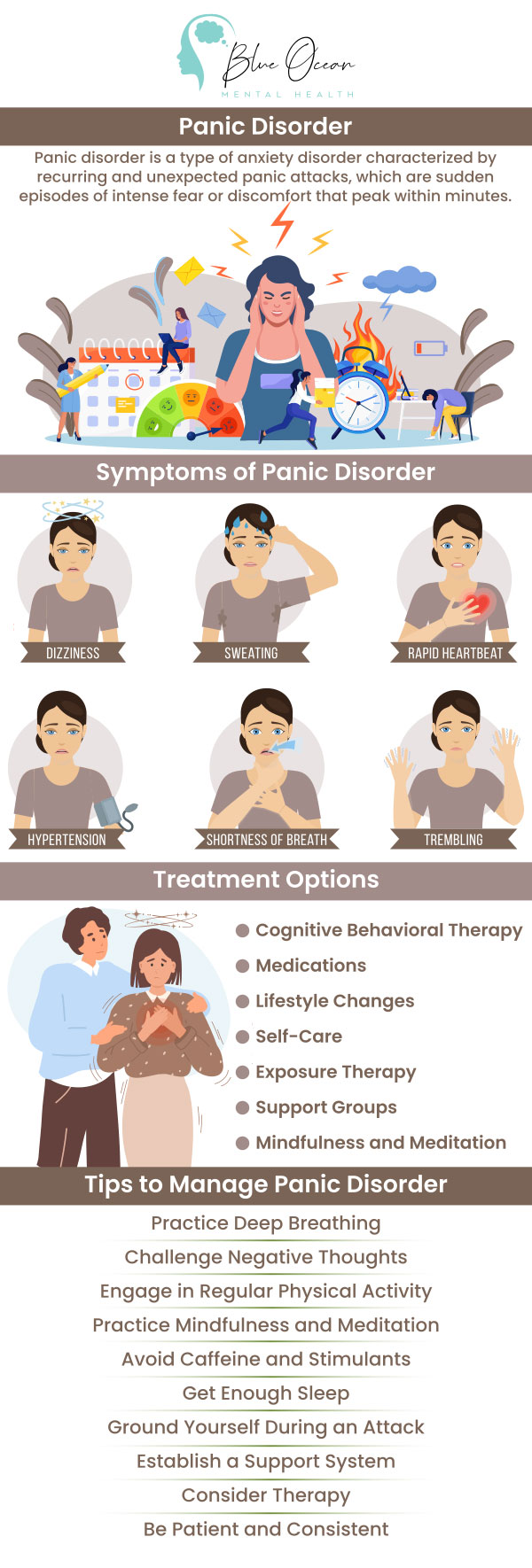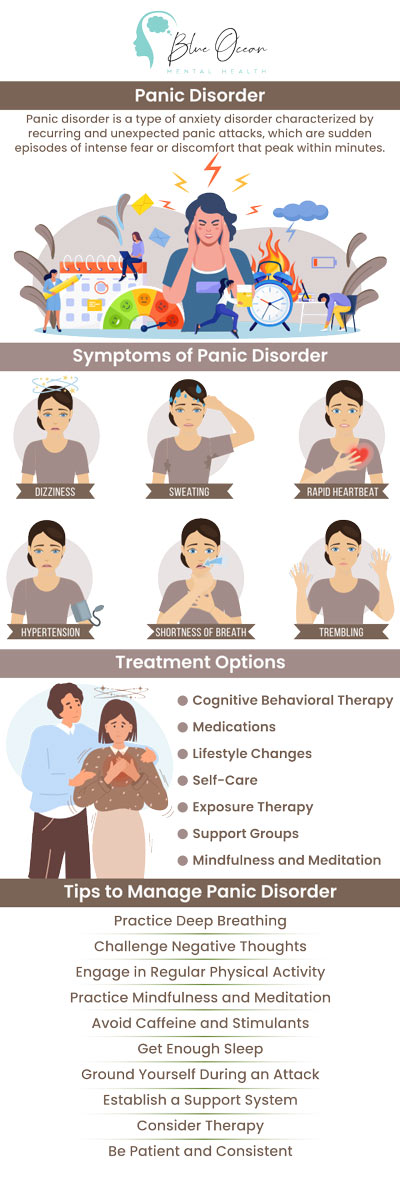Panic Disorder Treatment Clinic in Los Angeles, CA
If you’re struggling with panic disorder, visit Blue Ocean Mental Health in Los Angeles, CA, for effective treatment options tailored to your needs. Esder Shin, PMHNP-BC provides compassionate care to help manage panic attacks and reduce anxiety, guiding you toward long-term relief and improved well-being. For more information, contact us or request an appointment online. We are conveniently located at 11850 Wilshire Blvd, Suite 200A, Los Angeles, CA 90025.


Table of Contents:
What is panic disorder, and how does it differ from occasional panic attacks?
What are the common triggers for panic disorder?
What are the long-term effects of untreated panic disorder?
How does panic disorder impact daily life and functioning?
Achieve Calm and Control with Panic Disorder Treatment by Esder Shin, PMHNP, BC at Blue Ocean Mental Health
Panic disorder is a type of anxiety disorder marked by recurrent, unexpected panic attacks—sudden episodes of intense fear or discomfort that reach their peak within minutes.
What makes panic disorder different from occasional panic attacks is the frequency and unpredictability of the episodes, as well as the persistent worry about when the next attack might happen. This ongoing anxiety can lead to significant changes in behavior, such as avoiding situations or places where attacks might occur—sometimes resulting in agoraphobia.
Panic disorder can be overwhelming and disruptive. While many people experience isolated panic attacks during stressful times, panic disorder involves repeated attacks that are not always linked to a specific trigger and can cause ongoing fear and avoidance behaviors. Left untreated, these symptoms can interfere with work, relationships, and everyday activities.
Panic disorder is a complex condition marked by recurrent, unexpected panic attacks—sudden episodes of intense fear or discomfort that can feel overwhelming. While the exact causes remain unclear, researchers recognize that certain triggers are often linked to the onset of attacks in vulnerable individuals.
Stressful life events, such as the death of a loved one, divorce, or job loss, may provoke panic episodes. For some, reminders of past trauma or earlier panic experiences can act as triggers. Everyday situations perceived as threatening—such as crowded spaces, driving, or flying—can also bring on attacks. In addition, physical influences like excessive caffeine, certain medications, or stimulant use may increase the likelihood of panic symptoms.
Underlying medical conditions can also play a role. Disorders that affect breathing or heart function, including asthma, thyroid problems, or low blood sugar, may contribute to panic attacks in some cases. For others, episodes may occur without a clear external cause, with heightened anxiety or the fear of experiencing another attack becoming triggers themselves.
Understanding potential triggers is an important step in managing panic disorder and reducing the frequency and severity of attacks.
Untreated panic disorder can have a serious impact on overall health and quality of life. Frequent and intense panic attacks often create persistent anxiety, leaving individuals in constant fear of when the next episode will occur. This ongoing worry can lead to avoidance behaviors, where people steer clear of places or situations that might trigger attacks. Over time, this pattern may escalate into agoraphobia, a condition marked by fear of leaving home or entering public spaces.
The chronic stress and fear linked to panic disorder can also increase the risk of additional mental health conditions, including depression and other anxiety disorders. Daily challenges—such as maintaining relationships, focusing at work or school, or engaging in social activities—may become overwhelming, leading to isolation, loneliness, and hopelessness.
The effects are not limited to emotional health. Chronic anxiety and repeated panic attacks can disrupt sleep, cause fatigue, and weaken the immune system. Some individuals turn to alcohol or drugs as a coping mechanism, which can raise the risk of substance use disorders. Prolonged stress may also place strain on the cardiovascular system, raising medical concerns.
Seeking timely treatment is essential to reduce these risks, restore balance, and improve emotional, social, and physical well-being.
Panic disorder is more than just occasional anxiety—it’s a condition that can significantly disrupt your daily life and overall well-being. Individuals with panic disorder often experience sudden and repeated episodes of intense fear, known as panic attacks, which may occur unexpectedly. This can lead to ongoing worry about when the next attack might happen, creating a persistent sense of unease and fear.
As a result, many people start to avoid certain places or situations—such as public spaces, crowded areas, or even work and social gatherings—out of concern that another panic attack could occur. This avoidance can interfere with personal relationships, causing withdrawal from friends and family and resulting in feelings of isolation and loneliness. It can also affect productivity at work or school, making it difficult to concentrate and contributing to increased absenteeism.
Physical symptoms—including rapid heartbeat, shortness of breath, dizziness, and chest pain—can be frightening and sometimes mimic other medical conditions, leading to additional anxiety and frequent doctor visits. Over time, these challenges can diminish quality of life, erode self-confidence, and increase the risk of developing other mental health conditions, such as depression or substance use disorders.
At Blue Ocean Mental Health, we are dedicated to helping you navigate these challenges. We provide compassionate, evidence-based care tailored to your unique needs. Through a combination of therapy, medication management, and holistic support, we work with you to reduce the impact of panic disorder on your life, restore your sense of control, and help you reconnect with the things and people you value most.
At Blue Ocean Mental Health, Esder Shin offers targeted treatment for panic disorder—a condition marked by recurrent, unexpected panic attacks and persistent concern about their recurrence.
Beginning with a detailed assessment of your symptom history, triggers, avoidance behaviours, and their impact on daily functioning, Shin tailors a treatment plan to your specific experience.
Her approach integrates evidence‑based psychotherapy, strategic medication management when indicated, and holistic support to address both the physical symptoms (such as rapid heartbeat, shortness of breath, dizziness) and the behavioural patterns (e.g., avoidance of situations) that often accompany panic disorder.
The goal is not just reducing the frequency of attacks—it’s restoring your ability to engage in life confidently and freely, with fewer interruptions from fear and more presence in the moments that matter.
If you or a loved one is struggling with panic disorder, reach out to Blue Ocean Mental Health. Together, we can chart a course toward lasting relief and improved well-being. For more information, contact us or request an appointment online. We are conveniently located at 11850 Wilshire Blvd, Suite 200A, Los Angeles, CA 90025. We serve patients from Los Angeles CA, Pasadena CA, Beverly Hills CA, Glendale CA, Huntington Park CA, East Los Angeles CA, and surrounding areas.

Additional Services You May Need
• Psychiatric Evaluations
• Medication Management
• Brief Supportive Psychotherapy
• Diagnostic Confirmation
• Appropriate Referrals
• ADHD
• Anxiety
• Depression
• Post Traumatic Stress Disorder (PTSD)
• Obsessive compulsive disorder (OCD)
• Stress
• Bipolar Disorder
• Schizophrenia
• Panic Disorder
• Prolonged Grief Disorder
• Eating Disorders
• Telepsychiatry in California
• Genesight® – Genetic Testing

Additional Services You May Need
• Psychiatric Evaluations
• Medication Management
• Brief Supportive Psychotherapy
• Diagnostic Confirmation
• Appropriate Referrals
• ADHD
• Anxiety
• Depression
• Post Traumatic Stress Disorder (PTSD)
• Obsessive compulsive disorder (OCD)
• Stress
• Bipolar Disorder
• Schizophrenia
• Panic Disorder
• Prolonged Grief Disorder
• Eating Disorders
• Telepsychiatry in California
• Genesight® – Genetic Testing





